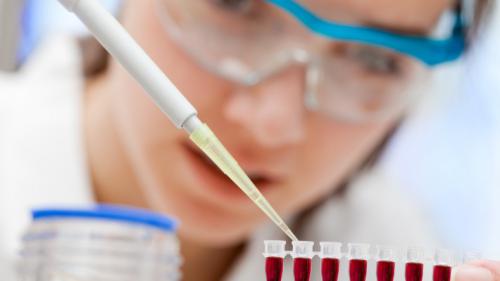
A baby might have its mother's eyes, but the mother has the child's DNA in her blood, at least during pregnancy. Researchers have now used this DNA to test for a genetic disease before birth. The technique might allow doctors to perform prenatal screening from only a sample of the mother's blood.
Prenatal diagnosis to check for chromosome abnormalities and genetic diseases is common. Doctors capture fetal cells for DNA analysis using amniocentesis, which taps some of the fluid in the womb, or chorionic villus sampling, which plucks a snippet of tissue from the placenta. Although safe, both tests slightly raise the chances of a miscarriage, spurring researchers to look for alternatives. In 1997, chemical pathologist Y. M. Dennis Lo, now at the Chinese University of Hong Kong, and colleagues discovered a rich vein of fetal DNA in, well, the mother's veins. About 10% of the DNA fragments floating in the mother's blood comes from the fetus, from dying placental or fetal cells. Clinical tests capitalize on this DNA to discern the baby's sex and determine whether mother and child have incompatible Rh blood groups, which can lead to fatal complications. But the difficulty of distinguishing maternal DNA from fetal DNA has prevented researchers from developing tests to test for most other genetic conditions.
To overcome this problem, Lo and colleagues applied cutting-edge DNA-sequencing techniques, which can rapidly sequence large amounts of DNA, to the billions of DNA fragments in a blood sample from a pregnant woman. Using DNA samples from a woman and her husband, the team analyzed approximately 900,000 single-nucleotide polymorphisms, one-letter changes in the genetic code that reveal where the DNA of the parents differs. With this information, the researchers first determined that the mother's blood carries all of the fetus's genome and which DNA the baby inherited from each parent.
The team then tested the approach on a pregnant women at an obstetric clinic. The woman and her partner each carried a faulty copy of the gene for one part of hemoglobin, which predisposed her fetus to ß-thalassemia, which can lead to severe anemia. The team's tests showed that the baby didn't have ß-thalassemia but was a carrier, receiving a mutated version of the gene from the father and a normal one from the mother. Analysis of the baby's DNA obtained by chorionic villus sampling, which the mother had also undergone, confirmed the diagnosis. "We have worked out the principle and achieved the first noninvasive genetic scan of a fetus from the mother's blood," says Lo, whose team reports its findings online in “Science Translational Medicine”.
Several obstacles stand in the way of widespread use of fetal DNA analysis, however. For one, the type of DNA sequencing used in the study is too expensive for clinical testing, although most researchers expect its cost to plummet in the next few years. The results are also very complex and hard to interpret, notes reproductive geneticist Diana Bianchi of Tufts University School of Medicine in Boston. "It's a brilliant proof-of-principle study, but it's not ready for clinical application."
Still, many researchers are impressed. "I think it's a beautiful piece of work," says molecular geneticist Arthur Beaudet of Baylor College of Medicine in Houston, Texas. "It's an important step in the direction of showing the capability of this approach," adds Mark Evans, an obstetrician- gynecologist and geneticist at the Mount Sinai School of Medicine in New York City. Molecular biologist Sinuhe Hahn of University Women's Hospital in Basel, Switzerland, says that the approach should allow fetal DNA testing for a variety of other genetic diseases, such as cystic fibrosis and Tay-Sachs disease. "In essence, you have the entire genome of the fetus at your disposal."



